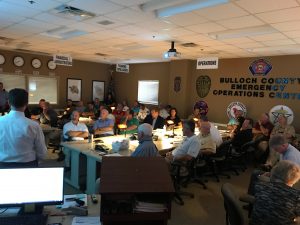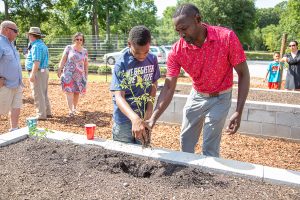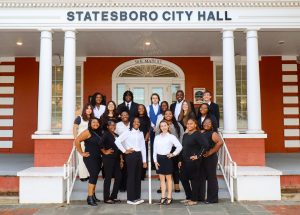2025 All-America City Finalist – Statesboro, GA
Statesboro, Georgia, a city of about 32,000 residents in Bulloch County, blends rural heritage with emerging urban vitality. Home to Georgia Southern University, the city enjoys a lively academic influence while retaining the traditional charm of its surrounding farmland and dirt roads. Over the past decade, Statesboro has evolved significantly—fueled in part by the arrival of a $7.6 billion electric vehicle plant bringing over 16,000 jobs—reshaping its economy and diversifying its community. Amid this growth, the city has intentionally cultivated a civic identity centered on inclusivity, equity, and shared progress.
Community engagement has flourished through both grassroots efforts and city-led commissions that encourage resident participation in addressing local issues. Programs like the Beloved Community and initiatives focused on sustainability, including GreenFest and the Statesboro Community Garden, highlight the city’s dedication to dialogue, environmental stewardship, and resilience. Facing challenges like frequent hurricanes, Statesboro continues to invest in preparedness and sustainability, all while advancing a vision of a vibrant, inclusive, and forward-looking community.
Community-Led Disaster Preparedness
Statesboro’s commitment to community-driven disaster resilience is exemplified by the work of Bulloch VOAD (Voluntary Organizations Active in Disaster), a coordinated emergency response network formed in response to the growing frequency of severe storms. Once rare, hurricanes now strike the area two to three times per year, disproportionately affecting low-income and rural residents. Previously, the city lacked an organized system to respond effectively. Bulloch VOAD filled this gap by uniting nonprofits, churches, government agencies, and community groups to deliver immediate relief, coordinate long-term recovery, and ensure information sharing—even when communication systems fail.

A key feature is volunteer training through the United Methodist Committee on Relief (UMCOR). To date, 46 residents have been trained in debris removal, roof tarping, and other essential tasks. During Tropical Storm Debby, Bulloch VOAD launched a community mapping tool using a Google Form to track road conditions, viewed over 180,000 times in just three days. The mapping initiative has since been adopted by the Bulloch Emergency Management Agency.
To further expand its reach, VOAD has acquired a fully stocked disaster trailer and established Pittman Park Church as an emergency shelter. The Bulloch Strong Fund has raised more than $60,000 for affected families. Looking ahead, the organization plans to increase volunteer training, invest in equipment, and enhance mapping technology to bolster its response capacity.
Cultivating a Greener Future
In response to rapid development and environmental concerns, Statesboro launched Keep Statesboro-Bulloch Beautiful (KSBB) and the Greener Boro initiative to promote sustainability through inclusive, community-led engagement. These efforts emerged from environmental impact assessments and community feedback that underscored the need for greater green spaces, energy efficiency, and conservation.
At the heart of the initiative is the Statesboro Community Garden, located in an underserved neighborhood with limited greenspace. With accessible raised beds and ground plots, it supports low-income families, schools, and community groups. The garden also hosts workshops on composting, urban farming, and organic gardening, strengthening both environmental literacy and community bonds.

Greener Boro helps residents in low-income areas reduce energy costs by promoting efficiency upgrades and access to state and federal programs. The program also advises the city council on sustainability policies.
Annual events like GreenFest and RecycleFest foster broader community participation, while partnerships with Ogeechee Riverkeeper support waterway cleanups and pollution prevention. Tree planting efforts have added hundreds of trees to reduce heat and improve air quality, and the Garden-to-Go initiative has distributed over 500 pounds of homegrown produce to food-insecure households.
Future plans include expanding sustainability education in schools, launching a citywide composting program, and encouraging active transportation. Together, KSBB and Greener Boro are shaping a more sustainable Statesboro.
Empowering Youth, Strengthening Community
In response to limited access for youth to education, employment, and civic opportunities, the city launched the Statesboro Youth Commission and Village Builders Initiative to engage youth and underserved families in leadership, service access, and local governance.
 The Statesboro Youth Commission creates structured opportunities for youth leadership, mentorship, and policy advocacy. Participants engage in mock city council sessions, lead community conversations, and co-design life skills workshops—particularly for those aging out of foster care. Two youth-led forums have directly influenced city policies and budget priorities.
The Statesboro Youth Commission creates structured opportunities for youth leadership, mentorship, and policy advocacy. Participants engage in mock city council sessions, lead community conversations, and co-design life skills workshops—particularly for those aging out of foster care. Two youth-led forums have directly influenced city policies and budget priorities.
The Village Builders Initiative, developed through community input, brings essential services directly to neighborhoods with limited access. Mobile resource days offer healthcare screenings, literacy programs, job training, and school supplies, along with free meals and activities. More than 500 families have connected with up to 50 service providers at each event.
Complementing these efforts is Career Connect, a paid summer internship program for high school students that pairs work experience with mentoring and financial literacy. The Youth Council, open to students in grades 8–12, builds civic skills and gives young people a direct voice in local governance.
By prioritizing youth leadership and equitable access to resources, Statesboro is laying the foundation for a more engaged and empowered next generation.
Some Related Posts
Thank You to Our Key Partners



